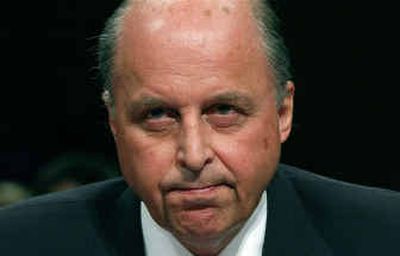Negroponte gets through committee

WASHINGTON – The nomination of the nation’s first national intelligence director, John Negroponte, was approved by the Senate Intelligence Committee on Thursday, clearing the way for the full Senate to consider President Bush’s pick.
The closed-door vote means the former Iraq ambassador and longtime diplomat could be in his new job this month. Negroponte’s nomination has generated little controversy in Congress.
However, Sen. Ron Wyden, D-Ore., and an intelligence panel member, said Thursday that he will oppose the nomination because, among other reasons, Negroponte was not candid enough about his record as ambassador to Honduras in the 1980s. During a confirmation hearing this week, Wyden questioned whether Negroponte had adequately reported human-rights abuses while ambassador.
As part of an overhaul of intelligence agencies last year, lawmakers approved the creation of a national intelligence director, which the Sept. 11 commission had recommended.
The director is supposed to bring together the country’s 15 spy agencies to improve coordination against threats that have evolved since the end of the Cold War.
The intelligence chief’s organization is just forming now. Negroponte is working near the White House as officials look for office space and consider how to structure his staff. The House and Senate have given preliminary approval to Bush’s request of $250 million to set up the operation and other intelligence-related projects.
The Senate committee also approved the nomination of Negroponte’s deputy, Michael Hayden, now the head of the National Security Agency. The panel, which often operates in secret, did not release details of the votes on Negroponte or Hayden.
Skeptics of the legislation passed in December have warned that the powers granted to the intelligence director are ambiguous and may open the door for defense and intelligence officials to run around the new chief’s authority.
At his confirmation hearing Thursday morning, Hayden told the Senate committee that he considers the powers laid out in the legislation a framework. He said that the intelligence director will have to build on the concrete use of his authority “early and often – and in actual circumstances.”
Lawmakers, meanwhile, are recommending forceful action. “Setting the precedent of a strong (national intelligence director) will likely mean the two of you will have to break some china,” Intelligence Chairman Pat Roberts, R-Kan., told Hayden.
Negroponte is not a stranger to politics or the inner-workings of government. He has spent 40 years in U.S. diplomatic and national-security circles, most recently as Iraq ambassador from June 2004 until March.
According to a personal disclosure report filed last month, Negroponte sold investments that posed a conflict of interest with his ambassadorship, including holdings in General Electric, which is helping to rebuild Iraq. His disclosure report was not specific about whether he’d have to shed any more of his portfolio.
Hayden, an intelligence veteran, has been in government for more than 35 years. Since 1999, he has headed the NSA, the government’s highly secretive code-breakers and code-protectors.